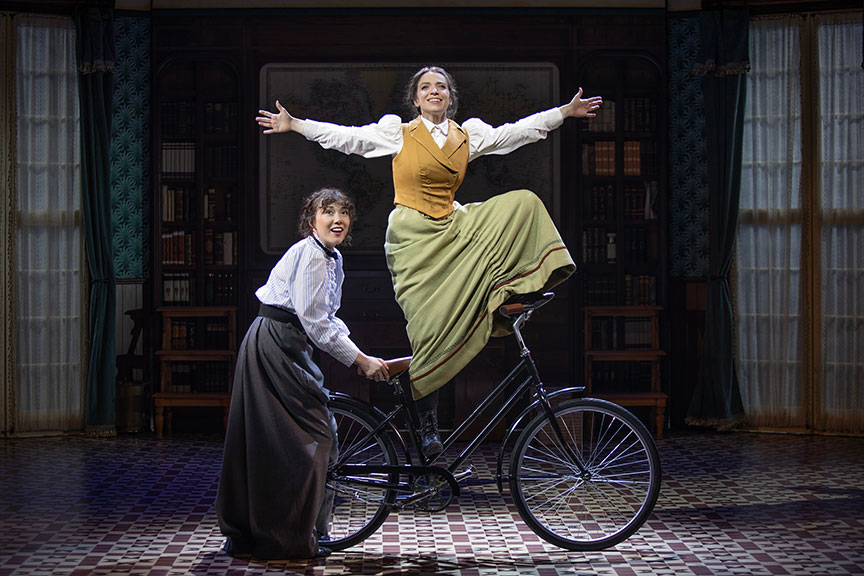|
Livvy Marcus (left) and Alex Finke in "Ride." Photo by Jim Cox Annie Kopchovsky, who became Annie Londonderry, may not have been an outright fabulist, but she was a fabulous storyteller. That’s the setup for the one-act musical “Ride,” in which having completed an around-the-world trip on a bicycle, Annie embarks on a new quest: convincing newspaper publisher Joseph Pulitzer to make her a regular columnist.
Doing so requires an image projector, which it turns out is broken, so the ever-resourceful, unstoppable Annie does the next best thing: She acts out her circumnavigation-on-wheels, with its keenest adventures and misadventures, right there in Pulitzer’s office and recruits the publisher’s mousey little secretary Martha to abet the re-creations. Did these episodes really happen? We know that this Jewish Latvian immigrant from Boston did indeed become the first woman ever to cycle around the world, between 1894 and 1895. The circumstances of what precipitated that feat and exactly what or who Annie encountered on her trip are debatable. The real-life Annie colorfully told her wondrous tales when she returned, as does the Annie of “Ride” (played with loads of moxie by Alex Finke). As the show makes clear, showmanship – or show-womanship – was this indomitable person’s stock in trade. Created by Freya Catrin Smith and Jack Williams, and directed by Sarah Meadows, “Ride” was a theatrical sensation in London. The Old Globe staging is its U.S. premiere. Here, it’s on a bigger stage and, as Meadows told me in a San Diego Union-Tribune interview, it’s been as such reinvented to a degree. The 90-minute show is duly entertaining with its snappy tunes, delightful stage props and no small exercising of physical comedy. Livvy Marcus as Martha gets to quick-change and multiple-impersonate throughout, portraying as she does the most important acquaintances (and perhaps more than that) that Annie meets along her journey. Finke has remarkable stamina in a production that she practically carries by herself, though the Boston (?) accent in which she speaks with so much stridency throughout comes off like a Streisand knockoff. It’s distracting and, I think, unnecessary. Her singing, on the other hand, is pure and pleasing, whether on a rousing number like the show’s title tune or the lilting lullaby near the end that punctuates Annie’s (and the story’s) true reality check. The construction of “Ride” is curious. Annie’s pitch to Pulitzer and the dramatization of her escapades around the world feel like two different shows, to the point where it’s easy to forget that she’s pitching to Pulitzer in the first place. Furthermore, the almost-relationships she has – with a customs agent and then a married man riding his own bicycle (both played by Marcus) – simply come and go. By the time we get that aforementioned reality-check scene, Annie is already a mass of contradictions. I admit it escapes me why “Ride” was so popular in London that many folks reportedly saw it again and again. It’s a fast-paced if not frantic diversion with a supporting character (Martha) who’s more likable than the protagonist. It’s a case of two actors working admirably hard to divert us. It is, though, a tale of an extraordinary individual who deserves to be more than an historical footnote. With the momentum that productions in America can give it “Ride” may well steer Annie Londonderry toward greater notoriety. “Ride” runs through April 28 at the Old Globe Theatre in Balboa Park.
0 Comments
Leave a Reply. |
AuthorDavid L. Coddon is a Southern California theater critic. Archives
July 2024
Categories |
David Coddon |
|
